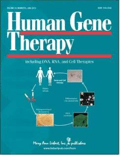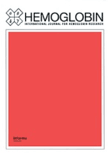
HUMAN GENE THERAPY
Scope & Guideline
Unveiling Breakthroughs in Molecular Medicine
Introduction
Aims and Scopes
- Gene Therapy Development and Application:
The journal highlights research dedicated to developing new gene therapy techniques and their applications in clinical settings. This includes studies on various diseases, particularly genetic disorders. - Gene Editing Technologies:
There is a strong emphasis on novel gene editing technologies, including CRISPR/Cas9 and related systems, which are explored for their potential to correct genetic defects. - Viral Vector Innovations:
Research on viral vectors, especially adeno-associated viruses (AAV), plays a crucial role in the journal. Studies focus on enhancing vector efficiency, specificity, and safety for delivering therapeutic genes. - Clinical Trials and Translational Research:
The journal publishes findings from clinical trials, contributing to the understanding of gene therapy's efficacy and safety in human populations. This includes phase I/II studies and long-term follow-up assessments. - Mechanisms of Gene Therapy:
Investigations into the underlying mechanisms of gene therapy, including immune responses, vector biodistribution, and gene expression regulation, are central to the journal's contributions.
Trending and Emerging
- Advancements in CRISPR Technology:
Recent publications show a significant increase in research related to CRISPR technology, including novel applications, improved precision, and safety measures in gene editing. - Combination Therapies:
There is a growing trend towards exploring combination therapies that integrate gene therapy with other treatment modalities, such as immunotherapy, to enhance efficacy against complex diseases. - Personalized Gene Therapies:
Research focusing on personalized medicine approaches, where therapies are tailored to individual genetic profiles, is on the rise, reflecting a broader trend in precision medicine. - Gene Therapy for Rare Diseases:
An increasing number of studies are dedicated to developing gene therapies for rare diseases, driven by the need for effective treatments for conditions that have limited options. - Regulatory and Ethical Considerations:
Emerging discussions around the regulatory landscape, ethical considerations, and the societal implications of gene therapy are becoming more prevalent in the journal, indicating a maturation of the field.
Declining or Waning
- Traditional Gene Therapy Approaches:
There has been a noticeable decline in studies focused solely on traditional gene therapy methods, as more advanced techniques like CRISPR and other gene editing technologies gain traction. - Basic Research on Gene Delivery Mechanisms:
Basic studies exploring the mechanisms of gene delivery have decreased, likely due to the shift towards more applied research that directly informs clinical practices and safety assessments. - Single-Gene Disorders Focus:
Research specifically targeting single-gene disorders may be waning as the field broadens to encompass more complex genetic conditions and polygenic disorders, which require multifaceted therapeutic approaches.
Similar Journals

JOURNAL OF GENE MEDICINE
Pioneering Research in Genetics and Drug DiscoveryThe Journal of Gene Medicine, published by Wiley, stands as a pivotal resource in the field of gene therapy and molecular medicine, with a rich history of dissemination of impactful research since its inception in 1998. With an ISSN of 1099-498X and an E-ISSN of 1521-2254, this esteemed journal plays a crucial role in advancing our understanding of genetics and drug discovery, reflected in its impressive 2023 Scopus rankings where it holds a Q2 classification in Drug Discovery and Q3 in several genetics-related categories. The journal aims to facilitate the exchange of high-quality research findings that bridge the gap between laboratory and clinical applications, making it an essential platform for researchers, academics, and healthcare professionals committed to the forefront of genetic innovation. Although it does not currently offer open access options, its reputation for rigorous peer review ensures that all published work meets the highest academic standards, providing a reliable reference for scientific inquiry in the United States and beyond. As the field rapidly evolves, the Journal of Gene Medicine remains at the helm, guiding future discoveries with its influential publications and comprehensive insights.

GENE
Illuminating the Path of Genetic AdvancementsGENE, an esteemed journal published by Elsevier, serves as a vital resource for researchers and professionals in the fields of genetics and medicine. With an ISSN of 0378-1119 and an E-ISSN of 1879-0038, this scholarly journal has been at the forefront of genetic research since its inception in 1976 and is set to continue until 2025. Situated in the Netherlands, GENE is recognized for its significant contributions, reflected in its Q2 ranking in both Genetics and Miscellaneous Medicine categories for 2023. This positioning within the Scopus rankings demonstrates its impact and relevance in a competitive field, where it holds the rank of #129 out of 347 in Genetics, placing it within the 62nd percentile. Although it does not offer open access options, GENE provides invaluable insight into contemporary genetic research, thereby fostering academic discussions and advancements. Researchers, professionals, and students alike will find GENE an essential platform for disseminating knowledge and exploring innovative developments in genetics and associated sciences.

CYTOTHERAPY
Pioneering Innovations in Regenerative Medicine.CYTOTHERAPY is a distinguished journal published by Elsevier Science Ltd, focusing on the critical fields of cell therapy, transplantation, and regenerative medicine. Since its inception in 1999, the journal has established itself as a vital resource for researchers and practitioners, contributing significantly to advancements in Cancer Research, Cell Biology, Genetics, Immunology, and Oncology. With an impressive range of Q2 rankings across multiple categories and a remarkable Q1 standing in Transplantation for 2023, CYTOTHERAPY delivers high-impact research that addresses the evolving challenges in these fields. While the journal does not offer open access, it remains a reputable avenue for disseminating pivotal studies and reviews that push the boundaries of cell-based therapies. Researchers, clinicians, and students alike will find CYTOTHERAPY an indispensable platform to stay abreast of the latest discoveries and innovations that are shaping the future of medical science.

Neurotherapeutics
Elevating the Standard of Care through Cutting-Edge Research.Neurotherapeutics, published by Springer, is a leading Open Access journal dedicated to the field of neurology and pharmacology, specifically focusing on innovative therapeutic approaches for neurological disorders. With an impressive impact factor and recognized as a prestigious outlet in its domain—ranking Q1 in Neurology (Clinical) and Pharmacology—this journal serves as an invaluable resource for researchers, healthcare professionals, and students aiming to stay updated with the latest advancements in neurotherapeutics. Since its inception in 2007 and now transitioning to Open Access from 2024, Neurotherapeutics enhances accessibility to high-quality research, ensuring that critical findings reach a global audience. Its current Scopus rankings further underscore its significance, placing it within the top echelons of pharmacology and clinical neurology. By fostering a robust platform for the dissemination of pioneering research, Neurotherapeutics plays a crucial role in shaping the future of neurological treatment and care.

HEMOGLOBIN
Advancing knowledge in hemoglobin research.HEMOGLOBIN, a prominent journal published by Taylor & Francis Ltd, serves as a vital resource in the fields of Biochemistry, Clinical Biochemistry, Genetics, and Hematology. Established in 1976, the journal provides a platform for innovative research and review articles that explore the complexities of hemoglobin pathology and related disorders, making significant contributions to our understanding of hematological diseases. With an ISSN of 0363-0269 and an E-ISSN of 1532-432X, HEMOGLOBIN has garnered attention within the academic community, reflected in its category quartiles for 2023, which rank it in the Q3 and Q4 levels across relevant medical and biochemistry categories. Although it operates on a subscription basis rather than as an open-access journal, it remains influential, providing critical insights to researchers, professionals, and students aiming to address the current challenges in blood research and related fields. The journal not only emphasizes high-quality scientific analyses but also seeks to foster collaboration and dialogue among academia and clinical practitioners, ultimately advancing the frontier of knowledge in hemoglobin and hematological research.

RUSSIAN JOURNAL OF GENETICS
Advancing Knowledge in the Science of GeneticsRUSSIAN JOURNAL OF GENETICS is a significant platform in the field of genetics, published by PLEIADES PUBLISHING INC since its inception in 1996. With an ISSN of 1022-7954 and an E-ISSN of 1608-3369, the journal focuses on a wide array of topics within genetics, providing researchers, professionals, and students with insights into advancements and discoveries in this ever-evolving discipline. While it currently holds a Q4 ranking in the 2023 Genetics category according to Scopus, representing invaluable opportunities for knowledge dissemination, the journal is actively working to enhance its impact in future rankings. Readers will find the journal a repository of diverse genetic research findings, methodologies, and theoretical advancements. Although it is not an open-access journal, it is committed to serving the academic community through rigorous peer-reviewed articles. With a consistent publication trajectory spanning to 2024, the RUSSIAN JOURNAL OF GENETICS remains a crucial resource for those aspiring to stay at the forefront of genetic research and applications.

Oncology Research and Treatment
Transforming oncology through collaboration and discovery.Oncology Research and Treatment, published by KARGER, is a highly regarded academic journal dedicated to advancing the field of oncology through rigorous research and clinical insights. With a history spanning from 1978 to 1997 and continuing from 2013 to 2024, this journal provides a vital platform for researchers and professionals in cancer research, hematology, and related disciplines. Though currently listed in the Q3 tier of 2023 for Cancer Research, Hematology, and Oncology, its growing readership and open access policy enhance its visibility and impact within the scientific community. Based in Switzerland, the journal features diverse access options, reflecting the global importance of oncology research. With a focus on innovative treatments and the latest methodologies, Oncology Research and Treatment plays a crucial role in fostering collaboration and dialogue among researchers, professionals, and students alike, helping to shape the future of cancer care and management.

CRISPR Journal
Shaping the Future of Gene ManipulationThe CRISPR Journal, published by MARY ANN LIEBERT, INC, is a pioneering platform dedicated to advancing the field of genetics and biotechnology through innovative research focused on CRISPR technology and its diverse applications. With an impressive Q1 ranking in both Biotechnology and Genetics for 2023, this journal is positioned among the leading publications in its field, showcasing groundbreaking studies from 2019 to 2024. While currently utilizing a subscription model, the journal's commitment to open science is reflected in its efforts to make high-quality research accessible to researchers, professionals, and students. The CRISPR Journal facilitates the dissemination of knowledge related to genomic editing technologies, fostering collaboration and advancing the understanding of gene manipulation, therapeutic techniques, and agricultural innovations. As a valuable resource for cutting-edge developments in the biochemistry and genetics landscape, this journal is essential for those seeking to stay at the forefront of CRISPR research and applications.

CURRENT OPINION IN GENETICS & DEVELOPMENT
Uncovering the latest trends in genetics.CURRENT OPINION IN GENETICS & DEVELOPMENT is a prestigious journal published by CURRENT BIOLOGY LTD that offers an insightful platform for the latest developments and emerging trends in the fields of genetics and developmental biology. Established in 1991 and set to continue until at least 2024, this journal achieves notable recognition in the academic community with a Q1 classification in both its major categories as of 2023. With a Scopus rank placing it within the top quartile for both genetics and developmental biology, it serves as an essential resource for researchers, professionals, and students seeking to enhance their understanding of genetic mechanisms and developmental processes. While currently not an open-access journal, readers can explore the collection of high-quality articles that contribute to shaping contemporary scientific discourse and fostering innovation within these dynamic fields. For those dedicated to advancing their research and knowledge, CURRENT OPINION IN GENETICS & DEVELOPMENT stands as a vital and influential academic publication.

TRENDS IN PHARMACOLOGICAL SCIENCES
Pioneering Research for Tomorrow's Pharmacological ChallengesTRENDS IN PHARMACOLOGICAL SCIENCES, an esteemed journal published by CELL PRESS, is a leading platform in the field of pharmacology and toxicology, with an impressive history since its inception in 1979. With an impact factor that places it in the top quartile category (Q1) for both pharmacology and toxicology as of 2023, it is recognized for disseminating high-quality, peer-reviewed research that shapes the future of these disciplines. The journal is indexed with a robust standing in Scopus rankings, positioned at rank #2 in Toxicology and #6 in Pharmacology, both boasting an extraordinary percentile of 98. Researchers, professionals, and students benefit from its comprehensive coverage, which spans cutting-edge advancements, review articles, and significant trends in drug development and toxicity assessment. While the journal does not currently offer open access options, it remains a vital resource for the academic community, ensuring critical insights into the complexities of pharmacological sciences are readily available to enhance research and practice.